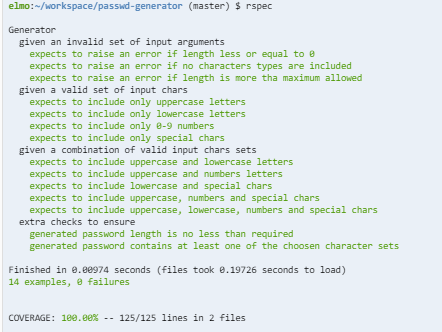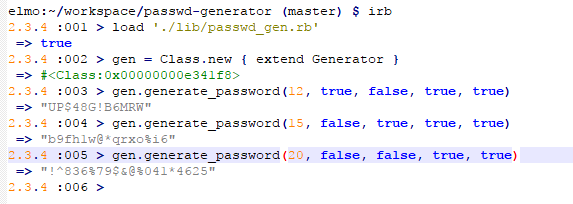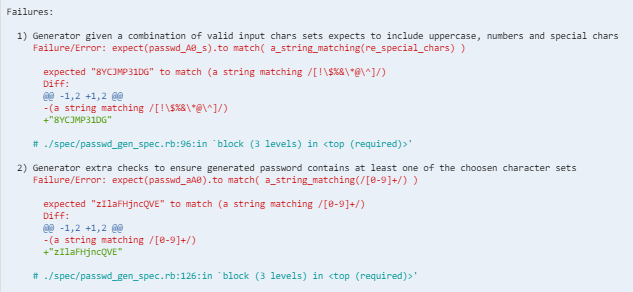- clone the repo and install the Ruby gems (for testing and code coverage gems)
$ git clone https://github.com/elenamorton/passwd-generator.git
$ cd passwd-generator
$ bundle install- run tests
$ rspec- test coverage
- load the module into the
irb
We have to load the file first, and then create an object as follows gen = Class.new { extend Generator }. Access the generator_password method through the gen object as follows:
- ruby 2.3.4p301
- rspec (3.6.0)
- simplecov (0.15.0)
- Allow a variable length of the generated password;
- Allow the generated password to contain uppercase chars, if chosen;
- Allow the generated password to contain lowercase chars, if chosen;
- Allow the generated password to contain any numbers 0 to 9 chars, if chosen;
- Allow the generated password to contain the
!$%&*@^special chars, if chosen; - Use password generator signature in Java syntax as:
String generatePassword(int length, boolean uppercase, boolean lowercase, boolean number, boolean special) - No dependencies on external libraries/services that could generate a password
As a user
So as I can get a secure password
I'd like to be able to set the length and character set types of the password
- The caller is specifying all five arguments in the right order when calling the password generator method.
- No invalid input parameters for the character set types.
The current design contain a Generator module, with a public generate_password method and several helper private methods.
The design tries to follow the rules for low-cost maintainable code, like: DRY code, methods with single responsibility, loose dependency by injecting arguments as a hash object in get_password(args), which also encapsulates the password implementation.
The name of the generator method is changed to comply to Ruby style, as
generate_password, instead of Java style notation.
- It is hard to use correctly the current
generate_passwordmethod having so many arguments.
The method signature is error-prone, making easy to set the arguments in the wrong order, or with wrong values.
- There are no duplicated characters in the generated password, unless the required
lengthis larger than the selected character sets size.
For instance, if the
length = 80, and we only selectuppercaseandspecial, we would have a gap not being able to fill in up to the required size, as we use26 + 7 = 33only characters. The current implementation uses aarray_padding(len, arr)method to populate the remaining80 - 33empty slots.
- The generated password is not always containing characters from all the selected sets.
The internally generated 'full-size' password contains all characters selected. The final password, which is extracted to certain size using
.sample(args[:length]), can miss characters of any type. This is noticable while running the test suite and getting errors like below.
The closer the final password size to the internal 'full-size' password, the lower the possiblity of getting such errors.
At present, the following three suggestions are provided for improving the password content with all selected character sets.
- Use of a random generator inside the Array
shufflemethod:
arr.shuffle(random: Random.new(56012))This may require many tries to determine the acceptable random seed, and also can make the password less secure with same sequence generated.
- Use of a ranking system based on the number of characters in each selected set relative to the password required length.
E.g. for a password of
length = 10characters, withuppercase,lowercase,number, andspecial, we should get4 - uppercasecharacters,4 - lowercasecharacters,1 - numbercharacter, and1 - specialcharacter. The total characters length is26 + 26 + 10 + 7 = 69. The ratio we get is about1:7, resulting in:26 / 7 =~ 4 uppercase,26 / 7 =~ 4 lowercase,10 / 7 =~ 1 number, and7 / 7 = 1 special.
This solution involves extra calculations for each character sets length in final password.
- Use of a
'smart' reducer, that runs onto the internalfull-sizepassword and removes nearby characters belonging to the same character set.
E.g, for a
length = 10password, withlowercaseandnumbercharacters, we get a36full-size internal password as76sy3pcmtaqdob52v4xlkru08z9fwi1negjh. Thereducermay have initially a window set to3, and produce an interim result as76sy3pctado52v4xlru08z9fw1nejhhaving size30. On the next iteration, the window can be reduced to2, shorening the string more. Several runs would be required to downsize to thelength = 10size.


